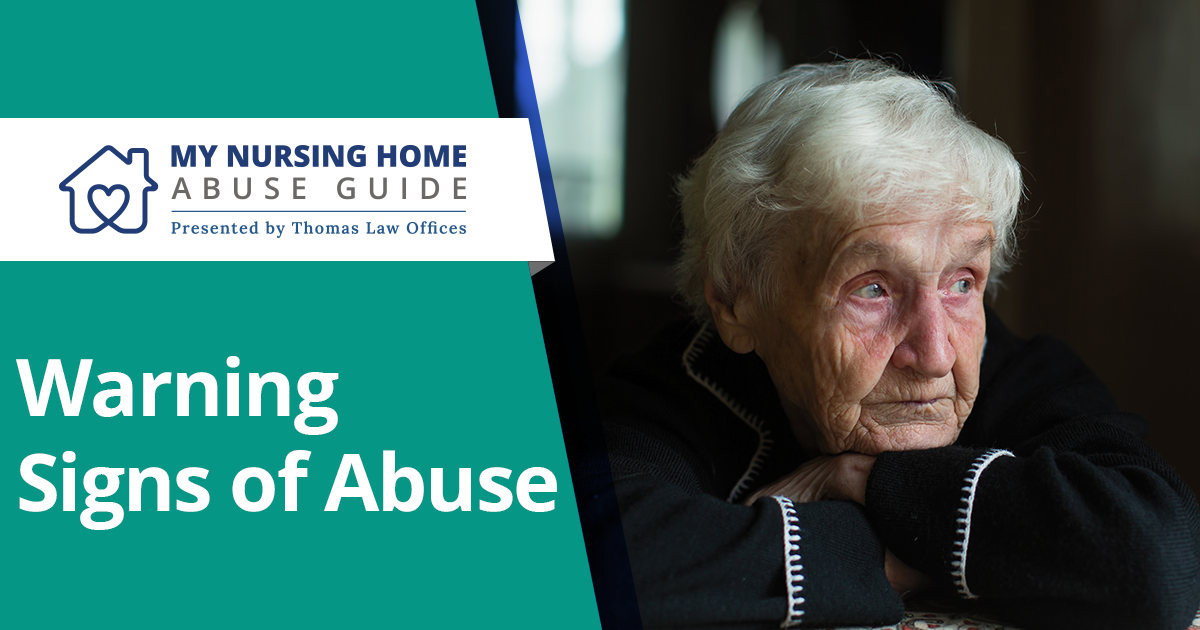Your Guide to Nursing Home Abuse & Prevention
Millions of elderly adults live in nursing home facilities.
Every one of them deserves to feel safe, protected, and respected.
Millions of elderly adults live in nursing home facilities.
Every one of them deserves to feel safe, protected, and respected.

Nursing homes play a vital role in caring for our elderly loved ones when they need additional support and attention.
However, instances of abuse in nursing homes unfortunately still occur. These situations highlight the importance of being vigilant and aware of potential warning signs. While most facilities provide excellent care, it’s essential to recognize red flags that may indicate abuse or neglect.
The Federal Omnibus Budget Reconciliation Act of 1987 (OBRA 1987. Pub L. No. 100-203) specified that nursing home residents had the “right to be free from verbal, sexual, physical, and mental abuse, corporal punishment, and involuntary seclusion” (42 CFR Ch. IV (10-1-98 Edition). It further defines “abuse” and “neglect” as follows:
By understanding the warning signs of nursing home abuse, families can take proactive steps to ensure the safety and well-being of their elderly relatives.
One of the most glaring signs of abuse is unexplained injuries or bruises.
While accidents can happen, consistent or recurring injuries without a plausible explanation should raise immediate concern. Pay close attention to injuries, such as fractures, cuts, or bruises, especially if they appear to be in various stages of healing.
Additionally, be wary of explanations that seem vague or inconsistent with the severity of the injury.
There are a few warning signs of nursing home abuse that you should be on the lookout for. Those include:
Changes in behavior or emotional state can also indicate potential abusive or neglectful treatment. If your loved one becomes withdrawn, anxious, or unusually agitated, it may be a sign that something is amiss.
Watch for sudden mood swings or a reluctance to interact with staff or other residents. These changes could stem from verbal or emotional abuse, neglect of basic needs, or fear of mistreatment.
Another warning sign to watch for is poor personal hygiene or living conditions.
Neglecting basic hygiene needs, such as bathing, grooming, or changing clothes, can indicate inadequate care. Similarly, living quarters that are consistently dirty, cluttered, or unsanitary may suggest neglectful conditions within the facility.
Pay attention to any unpleasant odors or signs of pest infestation, as these can also be red flags of neglect.
Weight loss or signs of malnutrition and dehydration should never be ignored. While some elderly individuals may experience appetite changes or difficulty eating, significant and unexplained weight loss can indicate neglect or intentional withholding of food and fluids.
Be observant of any signs of dehydration, such as dry mouth, cracked lips, or sunken eyes, as these can have serious implications for your loved one’s health.
Financial exploitation is another form of abuse that can target vulnerable elderly individuals.
The National Council on Aging (NCOA) reports that as many as five million elderly Americans are abused each year. That treatment results in financial abuse victims alone losing at least $36.5 billion per year.
Keep a close eye on your loved one’s financial transactions and statements for any unexplained withdrawals, unusual purchases, or sudden changes in their financial situation. Be wary of caregivers or staff who exert undue influence over financial matters or pressure residents into making financial decisions against their will.
Medical neglect is a serious issue in nursing homes and can have devastating consequences for residents. Watch for signs of untreated medical conditions, such as infections, the emergence of bedsores, also known as pressure ulcers, or unmanaged chronic illnesses.
Failure to administer prescribed medications or delays in seeking medical attention for health concerns should raise immediate alarm bells. Every resident has the right to receive appropriate medical care, and any deviations from this standard should be thoroughly investigated.
Social isolation or restricted communication with family and friends can be a tactic used by abusers to control their victims.
If your loved one suddenly becomes isolated or expresses fear of speaking openly with you, it’s essential to explore the reasons behind this behavior. Pay attention to any attempts by staff to monitor or restrict your interactions with your loved one, as this could be a sign of an abusive environment.
Trust your instincts and listen to any concerns voiced by your loved one. If something feels off or doesn’t sit right with you, don’t hesitate to investigate further. Take the time to talk openly with your loved one about their experiences and carefully observe their reactions.
It’s not unusual for victims of abuse to be frightened or ashamed of speaking up, so be gentle and compassionate if they seem hesitant.
Validate their feelings and assure them that you are there to support and advocate for them.
If you believe that your loved one is under imminent threat of harm, contact the authorities immediately.
Recognizing the warning signs of nursing home abuse is crucial for protecting the safety and well-being of our elderly loved ones.
By staying vigilant and proactive, families can help ensure that their relatives receive the quality care and respect they deserve. If you suspect abuse or neglect, don’t hesitate to take action and report your concerns to the appropriate authorities.
Together, we can create a safer and more supportive environment for our elderly population.
This website was created and is maintained by the legal team at Thomas Law Offices. Our attorneys are experienced in a wide variety of nursing home abuse and neglect cases and represent clients on a nationwide level. Call us or fill out the form to the right to tell us about your potential case. We will get back to you as quickly as possible.
866-351-2504